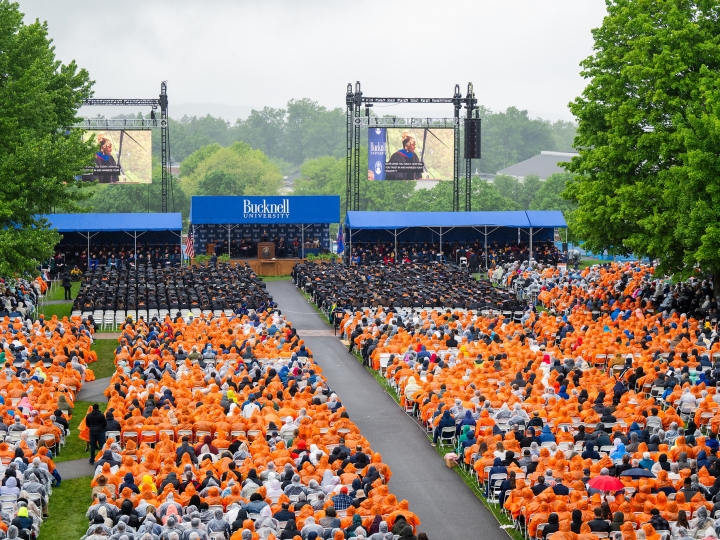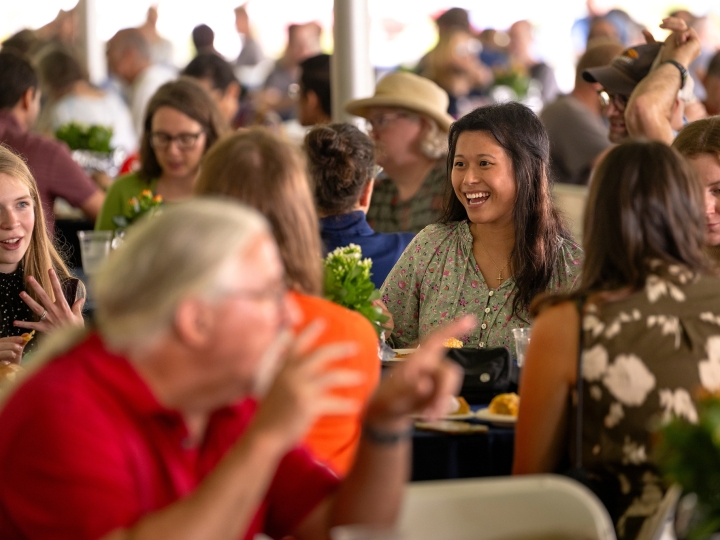Bucknell Recognizes Outstanding Faculty
September 27, 2023
On Sept. 5, Interim Provost Margot Vigeant recognized six faculty members from across Bucknell's three colleges who embody and exceed the calling of their profession with awards for inspiring teaching.
"Through these prestigious awards, we honor our colleagues who have gone above and beyond to demonstrate their passion for learning and a dedication to teaching and scholarship — to the great benefit of our students," Vigeant says.
Receiving 2023 teaching awards were:
Nina Banks, economics
Christian R. & Mary F. Lindback Award for Distinguished Teaching
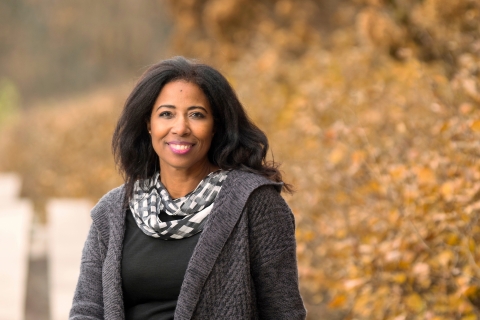
Professor Nina Banks, economics. Photo by Emily Paine, Communications
Banks teaches what her nominators describe as "high-impact courses" that successfully challenge students to reexamine their beliefs and think critically about the topics of race and gender. She is credited with developing courses across Bucknell's curriculum, including a foundation seminar on the Great Migration, an Integrated Perspectives course in collaboration with the history department, and a new economics course that resulted in a Davis Peace Project grant proposal written jointly by Banks and her students. This followed her work as the inaugural faculty-in-residence for Bucknell in Ghana. Banks' interdisciplinary approach has made major contributions to economics discourse at large, including in the prestigious Journal of Economic Literature and the Journal of Economic Perspectives. She researches and writes about significant Black thinkers and the Black political economy, engaging Bucknell and beyond in an important dialogue on the past, present and future of structural racism in the U.S.
Chris Ellis, political science
Presidential Award for Teaching Excellence
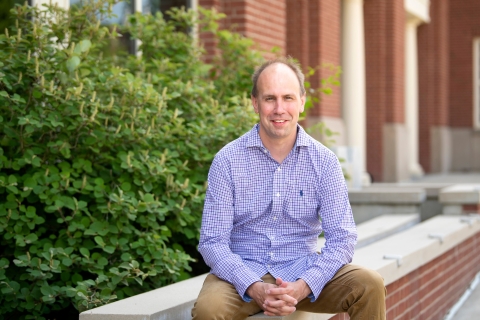
Professor Chris Ellis '00, political science, co-director of the Bucknell Institute for Public Policy. Photo by Emily Paine, Communications
Ellis' students describe him as an engaging and humorous mentor who is generous with his time and encourages them to think deeply about American political life. He is invested in his students personally and professionally, advising eight honors theses in his time at Bucknell. Ellis directs a national survey called YouGov, which collects public opinion data. In Ellis' classroom, students are not just recipients of knowledge but also active participants in the research process who generate survey questions, analyze the data and report their findings. This exposure to scholarship develops a passion for political research among his students. Student nominators describe Ellis as an inspiration who profoundly impacted their time at Bucknell. "I was privileged to discuss [ideas] with a professor who made me think more deeply about the material and who truly made it engaging and made me want to learn more every day."
Kelly Knox, theatre & dance
Presidential Award for Teaching Excellence
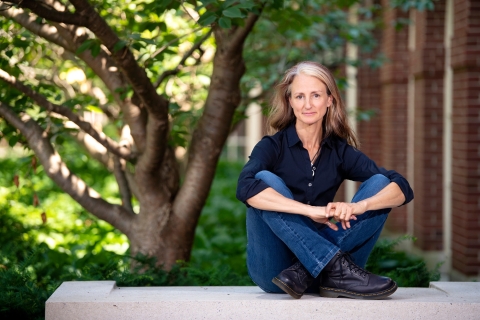
Professor Kelly Knox, theatre & dance. Photo by Emily Paine, Communications
As the director of the dance program for nearly a decade, Knox is committed to sharing the arts and empowering students touched by them. Colleagues and students describe Knox as an advocate and cheerleader for students, building confidence in individuals and the community. "Kelly saw leadership qualities in me before I saw them in myself and is the reason I became a student leader for the department," one of her student nominators wrote. Knox is also generous with her time to the Bucknell Arts Council and the Lewisburg community, and contributes to both on- and off-campus creative scholarship. According to her nominators, Knox "creates an inviting space that promotes inclusion and creativity, fosters curiosity and discovery, and challenges students to discover aspects about themselves they didn’t see before starting the course."
Elif Miskioglu, chemical engineering
Bucknell University Writing Across the Curriculum Award of Excellence
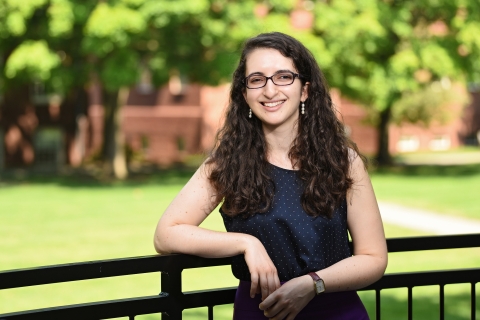
Professor Elif Miskioglu, chemical engineering. Photo by Emily Paine, Communications
For Miskioglu, writing is a process of revision and continuous possibility — the most important professional skill for engineers. Engineering is often stereotyped as a major for students who prefer science and math or "don’t like writing," according to Miskioglu. Since 2015, she has empowered students across the colleges in self-designed courses such as Technical and Professional Communication and Manipulating Nature. These courses demonstrate the three tenets of Miskioglu's student-centered writing theory, which aims to meet students where they are and acknowledges that each brings preconceived ideas about writing and themselves as writers to the class. She also participates in faculty writing workshops on campus that encourage the continuous growth she cultivates in students. Students are able to realize their untapped potential in her classes; one wrote that Miskioglu's course was "by far the most useful class I have taken yet in my life."
Nate Siegel, mechanical engineering
Class of 1956 Lectureship Award for Inspirational Teaching

Professor Nate Siegel, mechanical engineering. Photo by Emily Paine, Communications
Siegel's nominators describe him as "an exemplary teacher-scholar" and "true university servant" who pushes and inspires students to excel. Colleagues credit Siegel for transforming his courses into project-based learning experiences where students tackle open-ended problems to discover their own creative solutions. As a champion of hands-on learning opportunities for students on campus, he was instrumental in creating the campus' first makerspaces, and has helped faculty colleagues develop project-based engineering course assignments using 3D printing, laser cutting and other makerspace technologies. Outside the classroom, Siegel is a widely respected scholar; Stanford University ranked him as one of the top 2% of the most cited researchers in his field. He shares his expertise with students as a mentor for the Bucknell University Maker Society and Bucknell's student chapter of the American Society for Mechanical Engineering. "Professor Siegel always thinks big," a nominator wrote. "He expands the ideas around him. When people say 'no,' he sincerely asks, 'Why not?' He makes what we do as educators appear easy because our mission to educate competent engineers so deeply resonates with who he is as a person."
Michele Thornley, physics
William Pierce Boger Jr. M.D. Award for Excellence in Teaching in the Natural Sciences
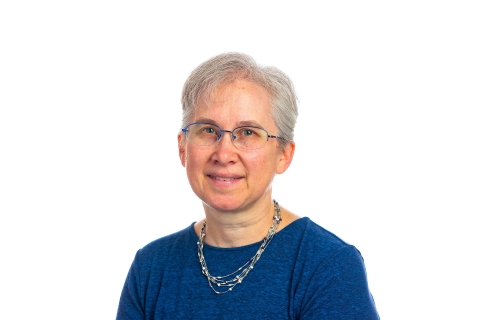
Professor Michele Thornley, physics. Photo by Douglas Kilpatrick
While introductory astronomy courses are often structured as lectures, students who take Bucknell’s ASTR 101-102 with Thornely enjoy hands-on, experiential learning activities. By providing them with access to modern instruments and opportunities to actively observe the night sky, Thornley deeply engages her students with important concepts that help them build science literacy. She is credited for developing the curriculum and building the astronomical infrastructure that has not only benefited her students but also her colleagues who also teach astronomy, a nominator wrote. Thornley's "activities empower students to make observations of their own environment and help them to understand that astronomy (and more generally, physical science) is not a purely academic enterprise, but instead provides a useful way to understand the world around them."
